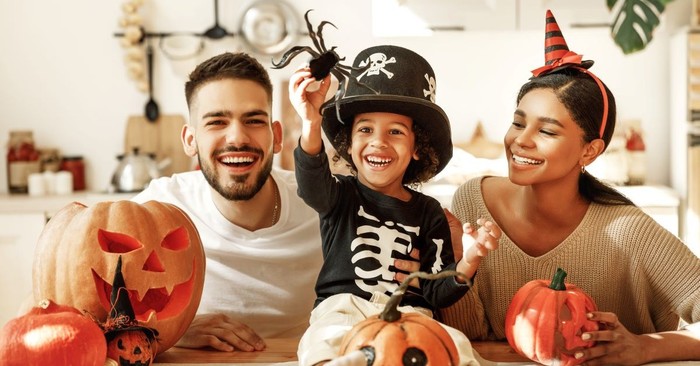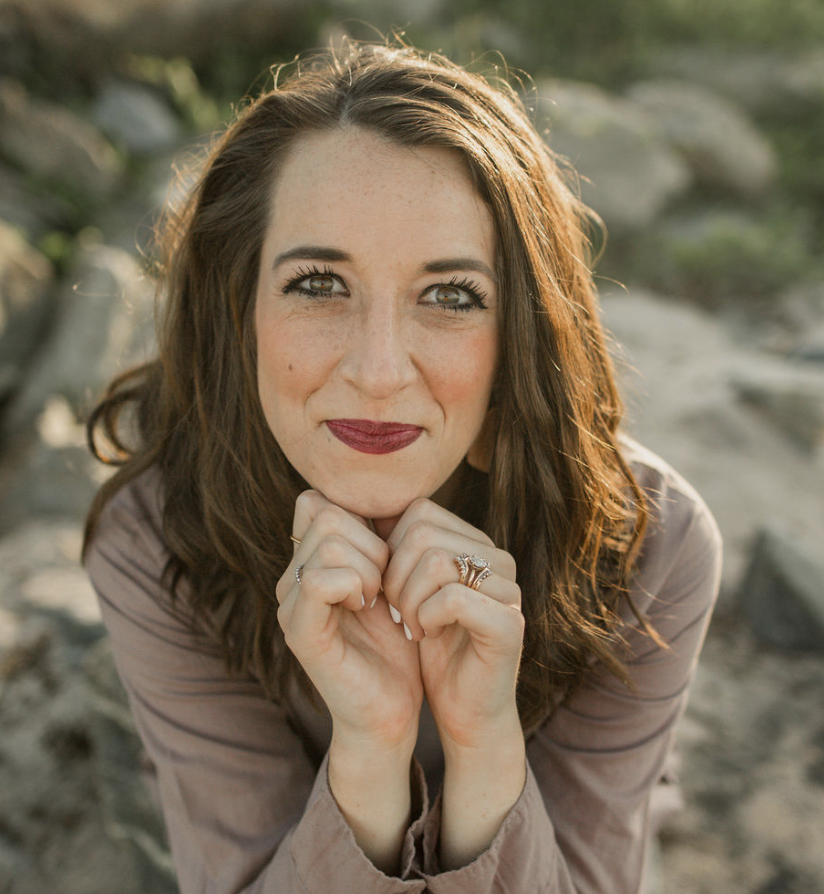
Christian mamas, refuse to be ignorant of the "why" behind so much of what we now know and celebrate as part of Halloween... and how some of those darker practices infiltrate our everyday culture.
I was properly warned that motherhood would change my world, and though I heeded all advice, mentally preparing for late-night tantrums, wretched diapers, and the thirty extra minutes it would take to load up the car to run errands, I didn't process how motherhood would change me.
Better yet, motherhood has drastically shifted my faith, forcing me to not only come to grips with what I believe about Christianity's gray areas but how I will host conversations about those sacred spaces with my son. I want our home to serve a God who isn't afraid of our questions, but I want our home to honor the holy work that comes from wrestling with those questions and pursuing a counter-culture lifestyle.
I want our family to be different, not so we can receive praise or recognition but so we can rest our heads each night in the grace of knowing we are held and guided by the Most High. Nothing can protect my husband, my son, me, and our future children better.
With a holiday like Halloween, it's no secret that darkness looms. Gray questions surface. Unfortunately, many Christians are so busy judging those who do or don't participate that they miss the healthy conversations that live in the middle. Meanwhile, the beauty, restoration, and sacredness of church holidays like All Saints Day get lost in the smoke and rubble of these wars.
I would like to take a few moments to share my convictions, reflections, and shift in perspective on Halloween and All Saints Day, explaining how motherhood has forced me to reckon with how I was raised, what culture says, and where I believe God rests amid it all.
Halloween
I was raised in a Christian home but also celebrated Halloween. In fact, one of my favorite childhood pastimes was flipping through a kids' Halloween cookbook that showed you how to make zombie pigs in a blanket and creepy-crawly gummy worm punch. (The punch was harder to create than it looked. I could never nail the visual aesthetic.) Of course, my Bible-believing family never once pursued the dark parts of the holiday. We spent most of our time visiting our local church's trunk-or-treat or snagging expensive candy from my grandmother, yet I celebrated Halloween in ignorant innocence. Nothing more, nothing less.
But, now that my son is here, ignorance isn't acceptable. My husband and I decide what will and won't be celebrated in our home. Our decisions shape an innocent life's worldview. That's a heavy responsibility. A really heavy responsibility.
To be honest, for the past few weeks, the idea of celebrating Halloween has left my spirit feeling uneasy—not in a spooky way but with a sense of pause and caution.
I recently listened to Every Woman a Theologian's Phylicia Masonheimer as she spoke on her podcast, Verity, about the history of Halloween, explaining the pagan practices that take place on October 31st and the early church's beautiful, brave move to redeem the holiday. I learned that scarily enough, many of Halloween's wicken-based rituals are creeping into our everyday lives by means of crystals, terra cards, horoscopes, and cottagecore wear. Culture makes them seem harmless, surface-level, casual... just normal enough for Christians to engage. But it's a slippery slope when you understand the dark pits of witchcraft, the history of druids, and the truly nasty activities they partake in when Halloween rolls around. (I encourage you to personally research these religions and pagan practices. The more you know, the more of an informed, spiritually healthy decision you can make. But I also warn you to be mindful of the content. It's dark. Very dark. Cover yourself in prayer and let Scripture guard your mind as you read this information.)
Now, this doesn't mean if your child dresses up as Spiderman and snags candy from your neighbor that you are engaging in darkness. I'm not God, and I certainly have no place to judge your heart and your family's fall itinerary. However, before my son participates in anything Halloween-related, there are three questions our family will openly, honestly address:
1. What is the intention of the activity being hosted?
2. What is our intention in engaging in this activity?
3. Do we understand the history and meaning of the themes presented in this activity?
If my son wants to put on scarecrow face paint and eat his weight in candy from a local church's trunk-or-treat, I have no problem with that. This Halloween activity is rooted in redemption, community, and love. Our intention is to enjoy fellowship and witness to those who don't know Christ. Its history rests in the four walls of a Bible-believing, Spirit-led church that wants Christ's light to pierce the darkness.
But if any activity can't answer those three questions from a place of purity and Christ-centered love, our family won't participate.
Did I dress up as a witch or skeleton bride growing up? Yep. Will he be allowed to dress as a druid, ghost, or devil? Nope.
Did I attend haunted houses, haunted fields, and haunted hayrides? Yes, I did. Will he be allowed to visit those spaces? Absolutely not.
Did I attend not-so-Christian-based Halloween parties? I did. Will he be allowed to? Not as long as he lives under my roof.
This might seem a bit harsh, and it's certainly harsher than the way I was raised (even in a Christian home), but I know the fear and darkness these activities can create, the ways they can unsettle the mind and soul. I was a cast member in a haunted house in my college days, and now, nearly ten years later, I still feel a weight, spiritual guilt, for the fear I inflicted on others in the name of lighthearted fun. I remember the faces and screams of people I knew. Strangers I didn't know. It wasn't innocent. It wasn't kind. It wasn't lighthearted fun. It was dark. It was wrong.
Meanwhile, I truly believe that having honest, engaging conversations with children about why you aren't participating in those activities—and allowing them to find other healthy things to engage in—will teach them the importance of letting the heart of Christ rule in their lives and guide their decisions. There's beauty in vulnerable, hard, respectful conversations between parents and their children.
All Saints Day
I'm a Georgia peach, born and raised. I spent my Sundays at a red-carpeted Southern Baptist church where the hell, fire, and brimstone messages were hot, and the fried chicken served after the church service was even hotter. I was never introduced to a liturgical church calendar. Anything that seemed remotely invented or celebrated by a Catholic church was deemed wrong. So, naturally, I knew nothing of All Saints Day. It was three small words printed at the bottom of my school calendar, but that was all my ignorant, Protestant brain understood.
While I'm now non-denominational and only cling tight to the rule of Light and Love, I find beauty in the history of All Saints Day. Originally, All Saints Day was created by the ninth-century Catholic church and celebrated in May, but the holiday was later moved to November 1st to combat the pagan celebrations that plagued the early church's communities on October 31st. All Saints Day was founded to celebrate not only the martyrs the Catholic church dubbed saints but all great heroes of Christianity. Today, many Christians celebrate All Saints Day by hosting costume parties where participants can dress as their favorite Bible hero or Christian figure, like C.S. Lewis, Mother Theresa, or even Tim Tebow. (For his first All Saints Day, my little guy will be David, wearing a gray onesie with moccasins and sporting a staff with five stones as accessories. His giant fox will play dead as Goliath. Cute, right?)
Kids can have fun with this holiday, attending and even hosting their own All Saints Day parties. They can participate in things like an All Saints Day scavenger hunt, get their candy fix from an All Saints Day goody bag, and decorate with All Saints Day garland.
As someone who grew up in a Southern Baptist church and attended an evangelical, Protestant-based Christian school her whole life, the idea of an All Saints Day party would have once seemed, well, lame. Cheesy. Pushy. Plain weird. But in a world where the darkness is now too easily masked as light, in a world where a tiny little boy now depends on me to guide and nurture his soul, I am more willing than ever to do what others might deem culturally sheltered or weird to shield my home from evil. This welcomes God's total presence in my family's house and gives our total attention to His goodness.
As for Me and My House
I will never tell you whether or not you and your family should celebrate Halloween. That's a conversation reserved for you and the Holy Spirit. But I encourage you to consider the three questions above. Christian mamas, refuse to be ignorant of the "why" behind so much of what we now know and celebrate as part of Halloween... and how some of those darker practices infiltrate our everyday culture.
No matter where you pitch your tent and how you choose to spend October 31st and November 1st, may your family stand firm in this:
"As for me and my house, we will serve the Lord." Joshua 24:15
Photo Credit: ©GettyImages/evgenyatamanenko









